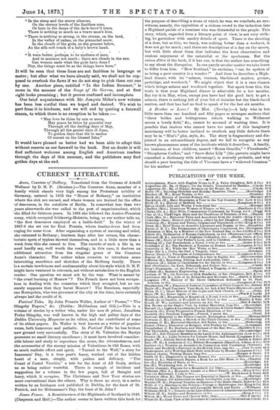CURRENT LITERATURE.
Anna, Countess of Stolberg. Translated from the German of Arnold Vollmer by D. M. P. (Strahan.)—The Countess Anna, member of a family which stands very high among the Protestant nobility of Germany, entered in 1853 the "House of Bethany," an institution where the sick are nursed, and where women are trained for the office of deaconess, in the outskirts of Berlin. In somewhat less than two years afterwards she was called to the post of superintendent, which 'she filled for thirteen years. In 1864 she followed the Austro-Prassian army, which occupied Schleswig-Holstein, being, as our author tolls us, "the first deaconess employed on a battle-field." In the winter of 1867-8 she set out for East Prussia, where famine-fever had been raging for some time. After organising a system of nursing and relief, she returned to Bethany ; fourteen days after her return, the charac- teristic spots of typhus showed themselves, and in a little more than a week from this she ceased to live. The records of such a life is, we need hardly say, well worth the reading; in this case, it derives an additional attraction from the singular grace of the Countess Anna's character. The author takes occasion to introduce some interesting anecdotes and sketches of the Stolberg family. There is a eertain tawdriness and sentimentality about his style 'which D. M. P. might have ventured to retrench, not without satisfaction to the English reader. One question we must ask by the way. What is meant by 4' the creel burning of Moscow" ? The French have not been scrupn- Ions in dealing with the countries which they occupied, but no one surely supposes that they burnt Moscow ! The Russians, especially one Rostopchin, who was governor of the city at the time, have certainly always had the credit of it.


































 Previous page
Previous page